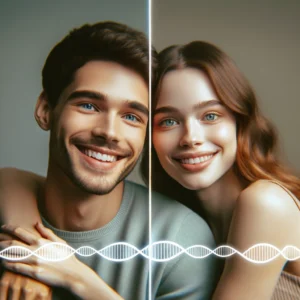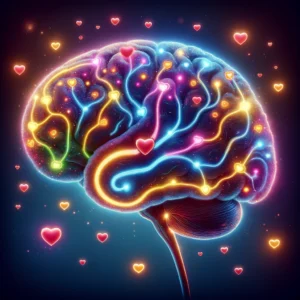You may have inherited more than your eye color from your parents. You may have also inherited your chances of marital happiness.
That’s right, your genes could be the key to unlocking the secrets of lasting love. How so?
Well, scientists have discovered a link between a certain gene variant and the levels of oxytocin – the hormone that regulates social bonding – in our bodies.
And this, in turn, could influence how happy we are in our marriages. Sounds intriguing, right?
If you want to learn more about this groundbreaking research and how it could affect your own relationship, read on.
We’re about to explore the fascinating connection between our DNA and our marital bliss.
This is the story of how nature and nurture work together to shape our love lives – for better or for worse.
The Elusive Recipe for Marital Bliss
Ah, marriage. That noble institution that joins two souls in love and partnership.
When all goes well, marriage can be the most profound and fulfilling of human connections. The bonding and sense of meaning It offers has transformative potential.
But making marriage work is far from easy. Despite entering matrimony starry-eyed and besotted, many couples find the reality much rockier. Maintaining that initial spark and a deep sense of connection in the midst of life’s stresses is tough.
Up to 50% of couples divorce, unable to salvage the broken pieces of a once blissful union. Even among those who stay together, a large percentage describe themselves as unhappy or unsatisfied.
Clearly, the recipe for sustained marital success is complex and elusive. For centuries, we’ve pondered:
- What makes marriage fireworks fizzle out?
- Why do some couples grow closer while others drift endlessly apart?
- How can we bottle the secret sauce that makes marital magic last?
Modern science is finally shedding light on these enduring mysteries of matrimonial success – and it turns out our genes have a major role to play.
The Crucial Hormone: Oxytocin

At the center of the genetic story of marital happiness is oxytocin – the hormone famed for its feel-good effects and social bonding powers.
Oxytocin is produced deep in the brain’s hypothalamus and then secreted into our bloodstream by the pituitary gland. It has profound impacts on both mind and body.
Oxytocin’s Role in Relationships:
- Facilitates bonding and attachment – crucial for romantic connections!
- Enhances trust – the foundation of a secure marriage.
- Reduces social anxiety – improves comfort and intimacy.
- Triggers protective instincts – amplifies care for a partner.
- Induces calm and contentment – defuses marital conflict.
It’s oxytocin that makes us feel so relaxed, affectionate, and emotionally joined after intimacy. No wonder it’s earned monikers like the “love hormone” and “cuddle chemical.”
This powerful molecule catalyzes the closest of human bonds. It’s absolutely pivotal for romantic attachment and marriage success.
But here’s the twist – our individual oxytocin biology can vary tremendously, thanks to differences in our genes. And this, it turns out, may make or break our marital bliss.
Could Genetics Predict Marital Destiny?
Here’s where things get really interesting. Exciting new research reveals a specific genetic variation affects our oxytocin levels and social behaviors. This, in turn, can directly impact marital happiness.
Let’s break it down:
- There’s a gene called OXTR that encodes the oxytocin receptor – this determines how we respond to oxytocin in our bodies.
- One variant of this gene, known as OXTR rs53576, comes in different forms.
- One of these forms, the GG genotype, causes elevated oxytocin and more sensitivity to its effects. It boosts sociability, empathy, and warm, communal behaviors.
So here’s the million-dollar question – do people with this “marital bliss” genotype have more fulfilling marriages?
The Happiness Gene: GG Genotype of OXTR rs53576

A pivotal study in 2019 provided compelling evidence that the GG genotype does indeed correspond to greater marital satisfaction.
The study examined 178 married couples of European ancestry. Those with at least one partner possessing the GG genotype reported higher marital quality and fewer marital problems. They felt more secure and content in their relationship compared to other genotype combinations.
Fascinatingly, the GG genotype explained roughly 4% of differences in marital satisfaction – a significant effect for a single gene variant.
These couples displayed less anxious attachment styles too – likely thanks to those elevated oxytocin levels dialing down social unease and boosting bonding behaviors.
The study convincingly demonstrated that this genetic variation predisposes people to experience greater fulfillment and security within marriage – a tantalizing sign we may have found a “happiness gene.”
The Rose-Colored Chemistry of Love
Oxytocin’s feel-good powers stem from its interactions with the brain’s reward and motivation circuits – it activates pathways flooded with dopamine during romance. No wonder marital bliss has such a euphoric, addictive quality!
Here’s a glimpse of the intoxicating neurochemistry of love:
- Oxytocin release during intimacy reinforces bonding by stimulating reward pathways.
- It amplifies the effects of dopamine – the quintessential pleasure molecule.
- Dopamine surges motivate us to pursue the “natural high” of a loving partnership.
- Together they generate that heavenly feeling of floating on cloud nine with the love of your life!
In essence, oxytocin molecules promote attachment by “tricking” us into craving our partner’s affection via feel-good chemistry. Our brains associate the “high” with being near them.
These insights help explain why those with the “happiness gene” variant feel more satisfied and securely bonded in their marriage. Their extra oxytocin gives love an added addictive quality!
The Attachment Factor: For Better or Worse

Another vital pathway by which oxytocin-linked genetics shape marital fulfillment is through attachment styles.
Attachment styles – our habitual emotional strategies for relating to loved ones – fall along a spectrum:
- Secure – comfortable with intimacy, confident in relationships.
- Anxious – require constant reassurance, clingy, fear abandonment.
- Avoidant – suppression of needs, distrustful of others’ intentions.
Research confirms secure attachment strongly predicts happier relationships. It allows affection and support to flow freely. Partners feel safe depending on each other.
Conversely, insecure styles like anxious and avoidant attachment strain bonds with neediness or emotional distance. The resulting instability leaves couples less satisfied.
Because the “happiness gene” variant boosts oxytocin and social confidence, it promotes secure bonding. This further explains its positive impact on marital fulfillment.
Oxytocin: The Master Molecule of Social Life
Zooming out from marriages, oxytocin governs our social adaptability and capacity for all kinds of relationships. This has profound implications for our happiness and self-actualization.
By motivating us to connect with others, oxytocin fulfills core human needs like:
- Belonging – being part of a “tribe” ensured survival.
- Cooperation – humans achieve more together.
- Intimacy – caring bonds provide meaning.
The far-reaching effects of oxytocin and oxytocin receptor genes like OXTR spotlight just how deeply our social nature is embedded in our biology.
Our well-being hinges profoundly on our connections. Our bodies synthesize molecules that compel us to be social. We’re biologically wired for relationships!
This is wonderful news – our genes prime us for fulfillment via human bonds! Of course, life circumstances also shape our interpersonal capacities. But by unlocking oxytocin’s secrets, we gain tools to potentially optimize our social talents.
Nature, Nurture, and Marital Destiny

These revelations about biologically-based differences in relationship skills fascinate and inspire me. They intimate that fulfilling marriages may be part destiny, part devoted nurturing.
There’s incredible promise in expanding our understanding of the underlying genetics that make relationships click – or fizzle out. This knowledge empowers us to:
- Identify our inborn social talents – Are you primed for marital success?
- Play to our genetic strengths – Capitalize on innate bonding aptitude.
- Compensate for weaknesses – Workaround genetic hurdles.
- Choose suitable partners – Seek someone whose social style complements yours.
At the same time, we must be wary of oversimplifying human behavior as merely “coded in our genes.” Life experience and conscious relationship work remain hugely important.
While genetic influences exist, we have considerable power to shape our relational paths. We must hold a nuanced perspective that integrates scientific insights with wisdom about human complexity.
Optimizing Marital Success: Beyond Genetics
Expanding our comprehension of the biological factors underlying marital fulfillment is just part of the equation. To build robust and lasting love, we must also:
- Cultivate emotional intelligence – deepen skills for communicating needs and navigating conflict.
- Practice acts of service – nurture the relationship daily with tokens of care.
- Share novel experiences – invigorate the spark with laughter and adventure.
- Be responsive lovers – ensure intimacy meets both partners’ needs.
- Embrace change gracefully – adapt to life’s transitions as a team.
- Seek help when needed – don’t hesitate to utilize counseling or therapy.
While our genetic variations may nudge us towards marital happiness, nurturing our love deliberately is key.
Even those lacking the “perfect marriage gene” can thrive by learning relationship skills and choosing partners mindfully. We must transcend our coding with wisdom, patience, and care.
The Future of Relationship Science

These revelations about the genetics of marital satisfaction are just the tip of the iceberg in elucidating the biological basis of human bonds.
As researchers uncover more about the neurobiology and evolutionary origins of social behaviors, we’ll gain unprecedented insights into romantic relationships and the broader human experience.
Some exciting frontiers in this groundbreaking field include:
- How gene-environment interactions shape social skills development.
- Epigenetic factors that activate or silence relationship-relevant genes.
- Neurochemical dynamics of different attachment styles.
- Connections between personality traits and genetic profiles.
- Evolutionary origins of human bonding behaviors.
By continuing to illuminate the complex interplay between our biology and intimate relationships, scientists are poised to transform our understanding of social life. We may unlock our greatest human potential – our capacity to love.
The Takeaway: Our Genes Don’t Spell Our Destiny
In closing, while genes exert considerable sway on marital fulfillment, they do not irrevocably spell our relational destiny.
We each possess tremendous potential for growth, healing, and intimacy regardless of the genetic hand we’re dealt. With care, intention, and support when needed, we can cultivate deeply fulfilling bonds.
While our biology whispers suggestions, our choices sing loudly. In the end, love is not about finding the “perfect match” but learning to cherish one another’s imperfect humanness. It is both science and art.
So take heart, seek wisdom, choose empathy, and embrace possibility – you hold the power to love boldly and be loved completely in return. The rest will fall into place, one day at a time.

